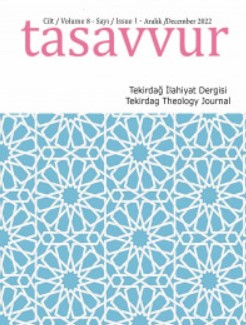Haccın Dönüştürücü Gücüne Şahit Olan Mali Sultanı: Mensâ Mûsâ
The Sultan of Mali, Witnessing the Transformative Power of Hajj: Mensa Musa
Author(s): Zehra Gözütok TamdoğanSubject(s): Islam studies, 13th to 14th Centuries, History of Islam, History of Religion
Published by: Tekirdağ Namık Kemal Üniversitesi İlahiyat Fakültesi
Keywords: Pilgrimage; Africa; Western Sudanese; Mali; Mansā Musā;
Summary/Abstract: Hajj is both an obligation on Muslims and a source of communication that allows unity among them. In the realization of this worship, in addition to the financial power of the individual, the distance of the place from Harameyn and the safety of the road route, etc. are also important. Except for the rulers of nearby regions, many state administrators made great efforts to make the pilgrimage comfortable, which they could not fulfill and which they saw as a matter of legitimacy on behalf of their administration. In particular, they gave importance to diplomatic meetings and gifts with the rulers of Haramayn in order to ensure that their pilgrims fulfill this obligation and reunite with their country and their families safely. Pilgrimage was much more difficult for Andalusia and African lands.Those who could not go to the holy land made it a tradition to send gifts, letters and odes. However, the African Sultans were an exception in this regard and made pilgrimages that would go down in history. They have also given importance to these journeys in order to have the necessary scientific knowledge so that they and their people can lead a life in harmony with the Islamic mentality. In this study, the pilgrimage that led to the recognition of Mansā Musā, the Sultan of Western Sudan/Mali of Africa which is ignored in terms of its material-spiritual wealth in its pre-colonial life, and the impact of his pilgrimage on his country will be discussed from various aspects.
Journal: Tasavvur Tekirdağ İlahiyat Dergisi
- Issue Year: 8/2022
- Issue No: 1
- Page Range: 629-662
- Page Count: 34
- Language: Turkish

